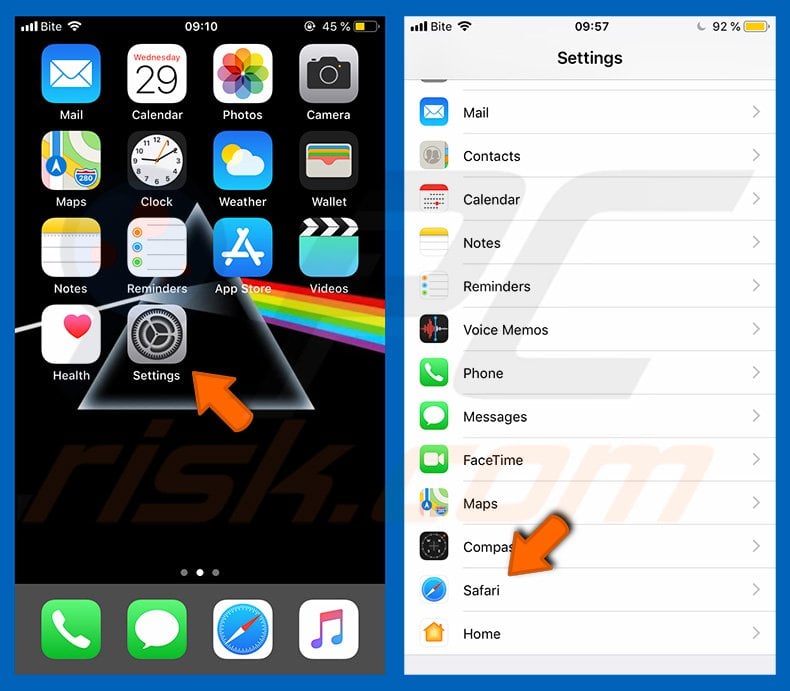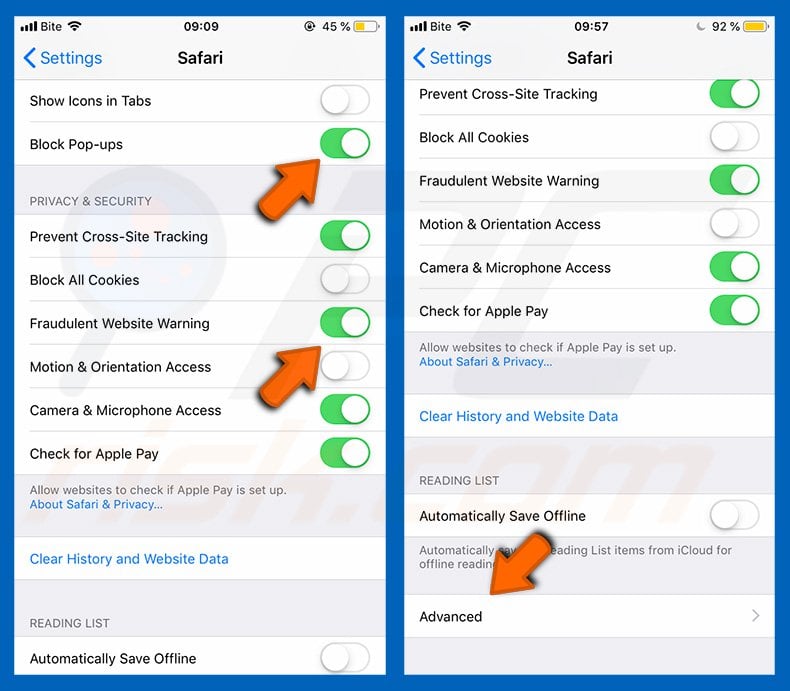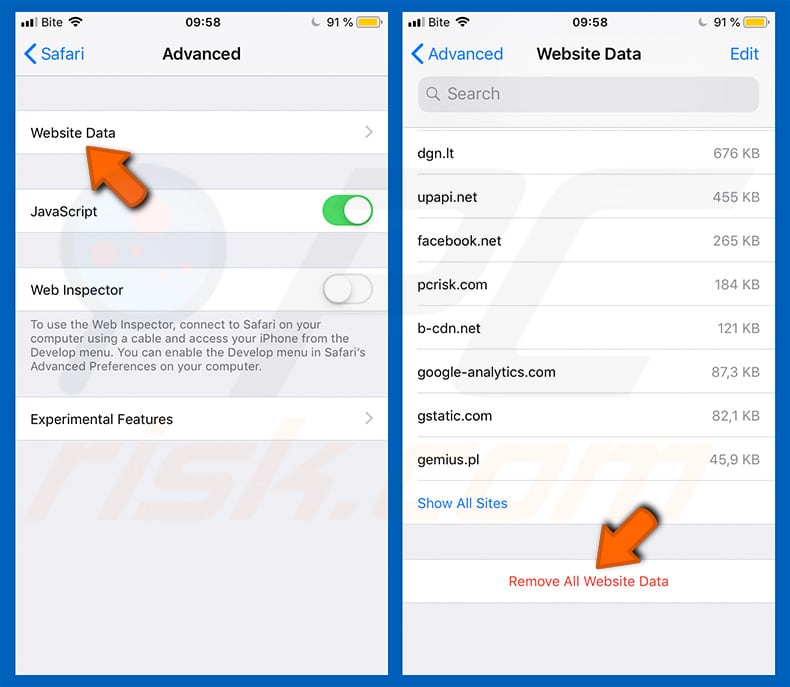Avoid being scammed by the heiipiossuport.info website
Mac VirusAlso Known As: heiipiossuport.info pop-up
Get free scan and check if your device is infected.
Remove it nowTo use full-featured product, you have to purchase a license for Combo Cleaner. Seven days free trial available. Combo Cleaner is owned and operated by RCS LT, the parent company of PCRisk.com.
What is the heiipiossuport[.]info website?
heiipiossuport[.]info is a deceptive website promoting various scams. At the time of research, this site ran a scam targeting iPhone users, however, heiipiossuport[.]info can also be accessed through other Apple products. This scheme has many similarities with technical support scams.
It claims that suspicious activity has been detected on the web pages users have recently visited and, to protect their mobile devices, they have been blocked. To unblock them, users are instructed to contact the scammers. Note that all of the information provided by heiipiossuport[.]info is false and in no way associated with Apple Inc.
Furthermore, no website can detect issues/threats present on visitors' systems and, hence, any that make such claims are scams. Few users access these deceptive/scam pages intentionally - they enter them via mistyped URLs or are redirected by intrusive advertisements or Potentially Unwanted Applications (PUAs).
This software does not need explicit user consent to be installed onto devices.
![heiipiossuport[.]info scam](/images/stories/screenshots202010/heiipiossuport-info-web-scam-main.jpg)
Once accessed, heiipiossuport[.]info displays a pop-up window. The text presented within it states that dubious activity has been detected on websites that users have recently visited. Supposedly, this is posing a risk to visitors' data. To protect their devices, users are urged to close the "notification" and call the toll-free "Apple Helpline".
After this pop-up is closed, heiipiossuport[.]info displays another claiming that users' iPhones have been blocked by Apple, due to illegal activity detected on their devices. The pop-up window clarifies that the illegal activity originated from certain sites that users have visited, which stealthily extract various personal information from their devices.
The scam then reiterates that users must call the provided number immediately. How this type of scam operates can vary, yet all iterations pose a significant threat to device and user safety. Firstly, despite being presented as such, the fake helplines are rarely free.
Furthermore, the "services" of scammers are often excessively expensive. The requested payments are often required to be paid in difficult/impossible to trace digital currencies (e.g. cryptocurrencies, pre-paid vouchers, gift cards, etc.). Scammers may also use untrusted payment portals, which record entered data.
As well as entering information via these pages, victims can be directly asked to provide their personal information such as names, addresses, emails, banking account and/or credit card details, etc. Scammers often attempt to gain remote access and control of users' devices.
Following successful connection, they can uninstall legitimate security programs, offer fake anti-virus products, steal files containing vulnerable information, infect the system with malware (e.g. Trojans, ransomware, etc.), and so on. Furthermore, scammers often target successfully scammed victims repeatedly.
To summarize, by trusting the scheme promoted on heiipiossuport[.]info, users could experience financial loss, system infections, serious privacy issues and even identity theft.
As mentioned, PUAs can force-open various untrusted and malicious web pages (including heiipiossuport[.]info), however, these apps can have additional capabilities. Adware-types deliver intrusive advertisement campaigns. The delivered ads diminish the browsing experience and, when clicked, redirect to dangerous sites.
Some can even stealthily download/install rogue software. Other PUAs called browser hijackers make modifications to browser settings and restrict/deny access to them to promote fake search engines. The promoted search engines are seldom able to provide search results, and so they redirect to Yahoo, Bing, Google and other legitimate search engines.
Most PUAs (regardless of type) have data tracking capabilities, which are employed to monitor users' browsing activity. Data of interest includes browsing and search engine histories, IP addresses, geolocations and other personally identifiable information. The collected data is then monetized by sharing with third parties (potentially, cyber criminals).
To ensure device integrity and user privacy, all suspect applications and browser extensions/plug-ins must be eliminated without delay.
| Name | heiipiossuport.info pop-up |
| Threat Type | Phishing, Scam, Mac malware, Mac virus. |
| Fake Claim | Scam claims users' devices have been blocked, due to their personal data being at risk. |
| Symptoms | Your Mac becomes slower than normal, you see unwanted pop-up ads, you are redirected to dubious websites. |
| Distribution methods | Deceptive pop-up ads, free software installers (bundling), fake Flash Player installers, torrent file downloads. |
| Damage | Internet browser tracking (potential privacy issues), display of unwanted ads, redirects to dubious websites, loss of private information. |
| Malware Removal (Windows) |
To eliminate possible malware infections, scan your computer with legitimate antivirus software. Our security researchers recommend using Combo Cleaner. Download Combo CleanerTo use full-featured product, you have to purchase a license for Combo Cleaner. 7 days free trial available. Combo Cleaner is owned and operated by RCS LT, the parent company of PCRisk.com. |
Umobile-security.com, iossecure.com, and vpnbestapp.com pop-up are some examples of other scam websites targeting iPhone users. The internet is rife with such pages and they use various tactics to abuse visitors' trust.
Popular scam models include warnings that the device and/or the data stored in it are at risk, alerts that an essential piece of software is out of date, fake prize giveaways and raffles, "amazing offers", and many others. Regardless of what these web pages claim, offer, request or demand, the purpose is identical: to generate profit for the scammers/cyber criminals behind them.
How did potentially unwanted applications install on my computer?
Browser hijackers, adware-type apps, and other types of PUAs are commonly distributed by integrating them into the download and/or installation set-ups of other programs, so that a proportion of users inadvertently download and install them together with their chosen software.
This distribution method is known as "bundling". Offers to download and install additionally-included apps usually appear in "Advanced", "Custom" and other settings of the set-ups (where they can usually be declined). Many users fail to check and change these settings, thereby granting permission for PUAs to be downloaded and installed by default.
In addition, unwanted downloads and installations are sometimes caused by clicking deceptive advertisements capable of executing certain scripts.
How to avoid installation of potentially unwanted applications
Download software and files from official websites and via direct links. It is not safe to use torrent clients, eMule (or other Peer-to-Peer networks), third party downloaders, unofficial websites or other sources of this kind. Avoid third party installers. Check "Advanced", "Custom" and other settings, and decline offers to download or install unwanted software.
Do not click ads that are displayed on dubious websites, since they can open other untrusted websites or even cause unwanted downloads and installations. Remove any unwanted, suspicious applications (extensions, add-ons, and plug-ins) that are installed on the browser.
The same should be applied to programs of this kind that are installed on the operating system. If your computer is already infected with PUAs, we recommend running a scan with Combo Cleaner Antivirus for Windows to automatically eliminate them.
Text presented in the first pop-up window displayed by the scam run on heiipiossuport[.]info website:
Attention!
We have detected a suspicious activity on sites you visited. Close this notification and follow the instructions to protect your data from possible loss. Call Apple Helpline for Instant Support +1-850-738-9027 (Toll Free).
Second pop-up window displayed by heiipiossuport[.]info scam:
![Second pop-up presented by heiipiossuport[.]info scam](/images/stories/screenshots202010/heiipiossuport-info-web-scam-2.jpg)
Text presented in this pop-up:
Your iPhone has been blocked!
Your device has been blocked and Apple I'd has been disabled due to some illegal activities.
Your recent visits in some unauthorized websites can fetch out you date , passwords and your personal credential information.Immediately call apply support +1(850)-738-9027 to unlock it !
0 minute 13 seconds
Call Now Cancel
Appearance of heiipiossuport[.]info scam mobile version:
![heiipiossuport[.]info scam mobile variant](/images/stories/screenshots202010/heiipiossuport-info-web-scam-mobile-variant.jpg)
To enable pop-up blocking, fraudulent website warnings, and remove web browsing data in mobile Apple devices, follow these steps:
First, go to "Settings", and then scroll down to find and tap "Safari".

Check if the "Block Pop-ups" and "Fraudulent Website Warning" toggles are enabled. If not, enable them immediately. Then, scroll down and tap "Advanced".

Tap "Website Data" and then "Remove All Website Data".

Instant automatic malware removal:
Manual threat removal might be a lengthy and complicated process that requires advanced IT skills. Combo Cleaner is a professional automatic malware removal tool that is recommended to get rid of malware. Download it by clicking the button below:
DOWNLOAD Combo CleanerBy downloading any software listed on this website you agree to our Privacy Policy and Terms of Use. To use full-featured product, you have to purchase a license for Combo Cleaner. 7 days free trial available. Combo Cleaner is owned and operated by RCS LT, the parent company of PCRisk.com.
Quick menu:
- What is heiipiossuport.info pop-up?
- How to identify a pop-up scam?
- How do pop-up scams work?
- How to remove fake pop-ups?
- How to prevent fake pop-ups?
- What to do if you fell for a pop-up scam?
How to identify a pop-up scam?
Pop-up windows with various fake messages are a common type of lures cybercriminals use. They collect sensitive personal data, trick Internet users into calling fake tech support numbers, subscribe to useless online services, invest in shady cryptocurrency schemes, etc.
While in the majority of cases these pop-ups don't infect users' devices with malware, they can cause direct monetary loss or could result in identity theft.
Cybercriminals strive to create their rogue pop-up windows to look trustworthy, however, scams typically have the following characteristics:
- Spelling mistakes and non-professional images - Closely inspect the information displayed in a pop-up. Spelling mistakes and unprofessional images could be a sign of a scam.
- Sense of urgency - Countdown timer with a couple of minutes on it, asking you to enter your personal information or subscribe to some online service.
- Statements that you won something - If you haven't participated in a lottery, online competition, etc., and you see a pop-up window stating that you won.
- Computer or mobile device scan - A pop-up window that scans your device and informs of detected issues - is undoubtedly a scam; webpages cannot perform such actions.
- Exclusivity - Pop-up windows stating that only you are given secret access to a financial scheme that can quickly make you rich.
Example of a pop-up scam:

How do pop-up scams work?
Cybercriminals and deceptive marketers usually use various advertising networks, search engine poisoning techniques, and shady websites to generate traffic to their pop-ups. Users land on their online lures after clicking on fake download buttons, using a torrent website, or simply clicking on an Internet search engine result.
Based on users' location and device information, they are presented with a scam pop-up. Lures presented in such pop-ups range from get-rich-quick schemes to fake virus scans.
How to remove fake pop-ups?
In most cases, pop-up scams do not infect users' devices with malware. If you encountered a scam pop-up, simply closing it should be enough. In some cases scam, pop-ups may be hard to close; in such cases - close your Internet browser and restart it.
In extremely rare cases, you might need to reset your Internet browser. For this, use our instructions explaining how to reset Internet browser settings.
How to prevent fake pop-ups?
To prevent seeing pop-up scams, you should visit only reputable websites. Torrent, Crack, free online movie streaming, YouTube video download, and other websites of similar reputation commonly redirect Internet users to pop-up scams.
To minimize the risk of encountering pop-up scams, you should keep your Internet browsers up-to-date and use reputable anti-malware application. For this purpose, we recommend Combo Cleaner Antivirus for Windows.
What to do if you fell for a pop-up scam?
This depends on the type of scam that you fell for. Most commonly, pop-up scams try to trick users into sending money, giving away personal information, or giving access to one's device.
- If you sent money to scammers: You should contact your financial institution and explain that you were scammed. If informed promptly, there's a chance to get your money back.
- If you gave away your personal information: You should change your passwords and enable two-factor authentication in all online services that you use. Visit Federal Trade Commission to report identity theft and get personalized recovery steps.
- If you let scammers connect to your device: You should scan your computer with reputable anti-malware (we recommend Combo Cleaner Antivirus for Windows) - cyber criminals could have planted trojans, keyloggers, and other malware, don't use your computer until removing possible threats.
- Help other Internet users: report Internet scams to Federal Trade Commission.
Share:

Tomas Meskauskas
Expert security researcher, professional malware analyst
I am passionate about computer security and technology. I have an experience of over 10 years working in various companies related to computer technical issue solving and Internet security. I have been working as an author and editor for pcrisk.com since 2010. Follow me on Twitter and LinkedIn to stay informed about the latest online security threats.
PCrisk security portal is brought by a company RCS LT.
Joined forces of security researchers help educate computer users about the latest online security threats. More information about the company RCS LT.
Our malware removal guides are free. However, if you want to support us you can send us a donation.
DonatePCrisk security portal is brought by a company RCS LT.
Joined forces of security researchers help educate computer users about the latest online security threats. More information about the company RCS LT.
Our malware removal guides are free. However, if you want to support us you can send us a donation.
Donate
▼ Show Discussion